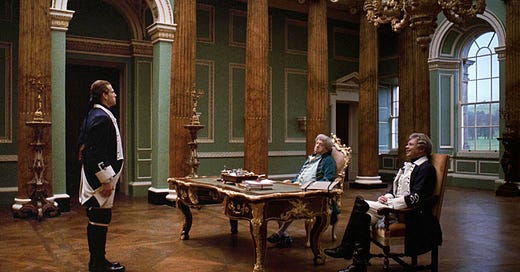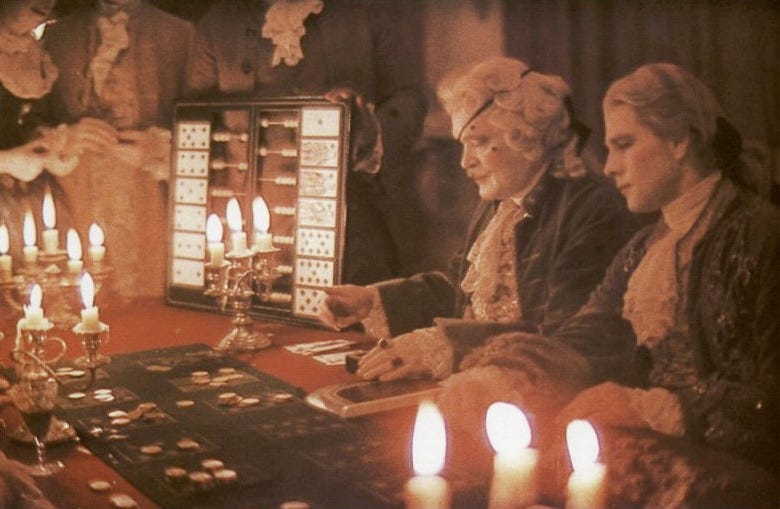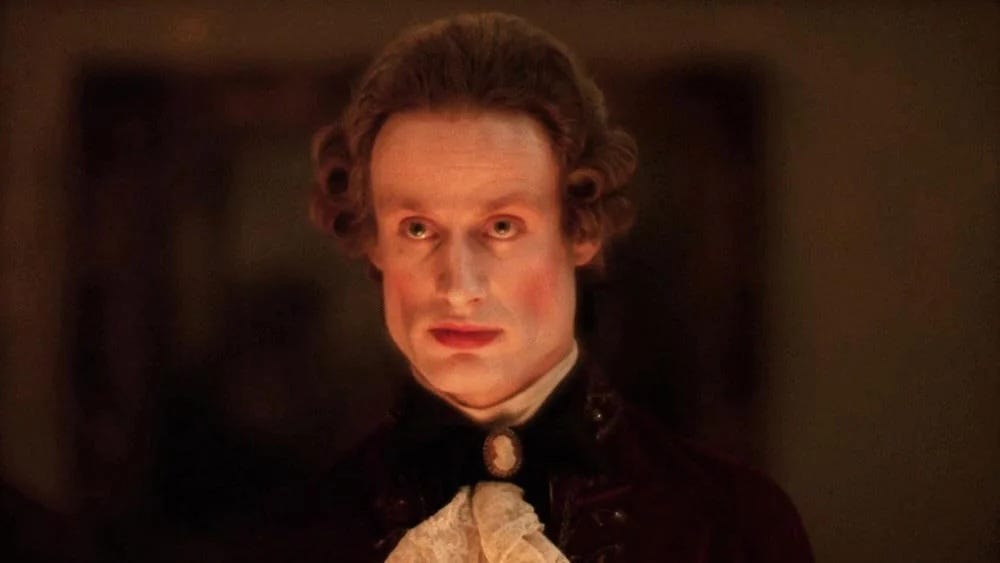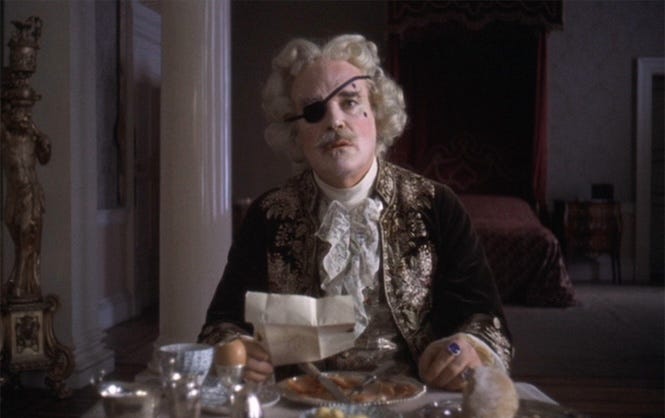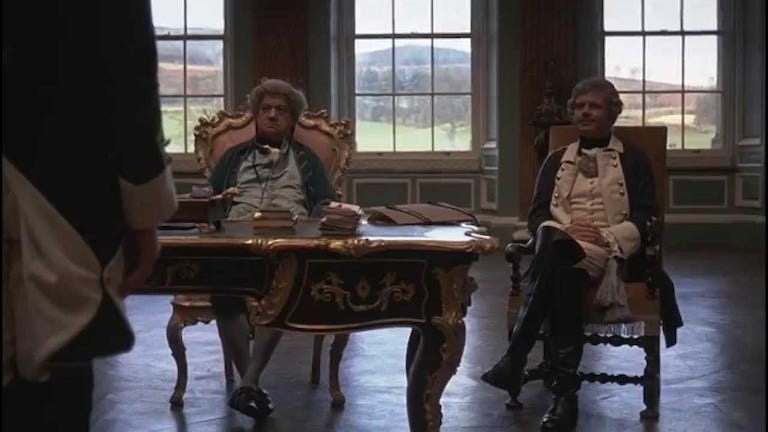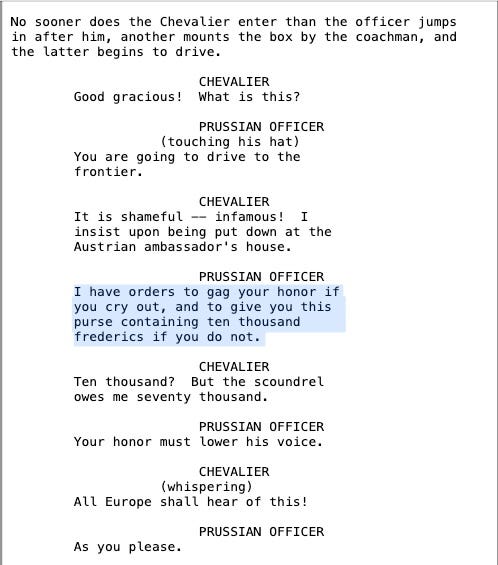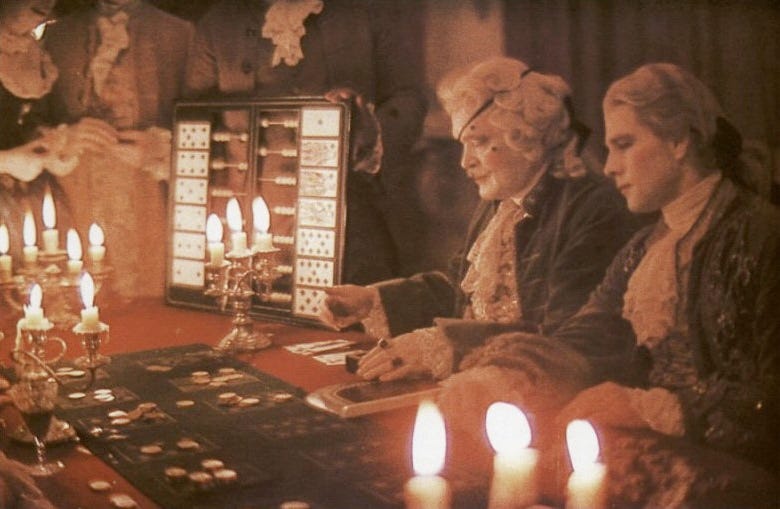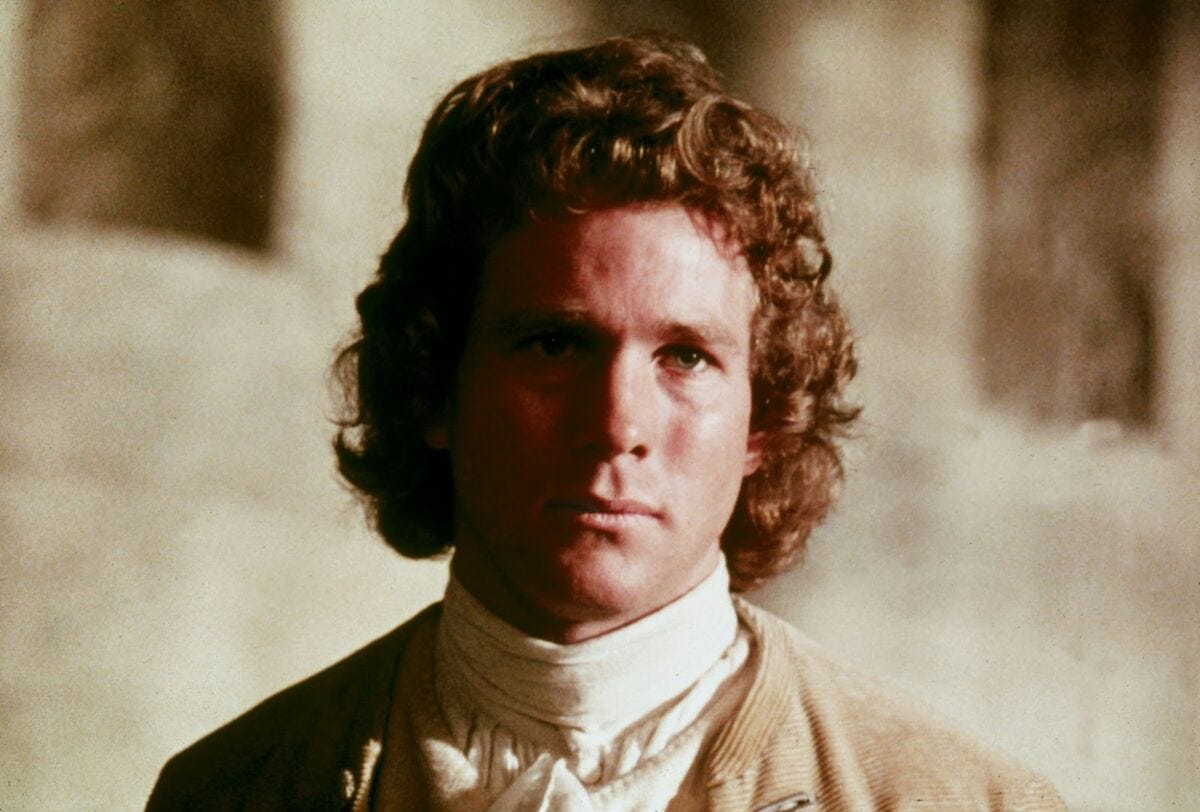Detailed Analysis of Character Motivations from 'Barry Lyndon'
An exercise in understanding the importance of social dynamics to intelligence
Context
In Stanley Kubrick’s Barry Lyndon, the Ministry of Police suspects that the Chevalier de Balibari, who ostensibly works as a diplomat in Prussia, is actually a spy.
Barry has been assigned by Captain Potzdorf’s uncle, head of the Ministry of Police, to spy on the Chevalier (working as his valet), but since Barry and the Chevalier are both Irishmen, they have become confederates.
The Chevalier is a gambler, and Barry helps him to cheat the Prince of Tübingen at a game of cards.
The Prince gambles on credit, which the Chevalier extends to him, but then the Prince stalls on paying his gambling debt, suspecting he has been cheated. He says this directly ("I suspect I have been cheated"), though he admits he cannot say exactly how, and so makes no direct accusation. Instead he says he will "pay at a later time."
Since Barry is assigned to report on the Chevalier's activities to the Ministry of Police, he reports that the Prince of Tübingen declined to pay the gambling debt, which he lost "fair and square." And of course, the Ministry reports this to the King, who intends to avoid any scandal.
Furthermore, the Chevalier advises Barry to notify the Ministry of Police that the Chevalier intends to demand satisfaction (a duel) from the Prince of Tübingen. Why?
This plot point reveals the complex web of motivations, perceptions, deceptions, and strategic calculations by the various characters involved. Each character’s decisions are influenced by their own goals, their understanding of others’ motives, and the potential consequences of alternative actions, as well as their own understanding of others' perceptions of the consequences of others' alternative actions.
Key Characters and Their Perspectives
1. The Prince of Tübingen
Motivations:
Avoid paying a large gambling debt he believes was obtained through cheating.
Protect his honor by not appearing gullible or admitting defeat to suspected frauds.
Perceptions:
Suspects that the Chevalier and Barry manipulated the card game but lacks concrete evidence.
Views paying the debt as an admission of either gullibility or weakness.
Deceptions:
By stalling payment without outright accusing the Chevalier of cheating (since he cannot say exactly how), the Prince implicitly casts doubt on the legitimacy of the game while avoiding direct confrontation. Instead he says he will "pay at a later time." This, of course, he intends never to do.
Alternative Options and Consequences:
Pay the Debt: Avoids immediate conflict but damages his reputation, as it implies gullibility. Also costs him a large sum of money, which he does not intend to lose when he believes he has been cheated.
Publicly Accuse of Cheating: Risks creating a scandal, especially without proof, which could backfire and tarnish his honor further. Also, could cost him his life in a duel.
Rational Choice:
Stalling payment without direct accusations minimizes personal risk and places the burden of escalation on the Chevalier.
2. The Chevalier de Balibari
Motivations:
Collect the Prince’s gambling debt.
Avoid exposure and arrest as a spy.
Secure safe passage out of Prussia.
Perceptions:
Recognizes the Prince’s refusal as a stalling tactic and suspects he’s gambling on the Chevalier’s reluctance to escalate the situation.
Aware of the Ministry of Police’s preference for maintaining public order. (And the King's interest in avoiding scandals and duels).
Deceptions:
Uses the threat of a duel to manipulate the authorities into intervening.
Alternative Options and Consequences:
Directly Demand Payment from the Prince: Risks escalating to a duel, which could attract unwanted attention and expose his status as a spy. Also, could cost him his life.
Fail to Press the Issue: Loses his winnings from the Prince, and also risks damaging his reputation as a gambler. (Because if he had been generating a good income from his gambling, and then the perception grows that no one has to pay him when they lose, that could cost him his income).
Rational Choice:
Orchestrate a scenario where the Ministry of Police intervenes to prevent a duel, ensuring he collects the debt and exits Prussia safely.
3. Captain Potzdorf’s Uncle (Prussian Ministry of Police)
Motivations:
Protect the King’s interests.
Avoid scandal and complications.
Maintain public order.
Avoid diplomatic embarrassment.
Perceptions:
A duel involving the Prince and a suspected spy is politically complicated.
Prefers a discreet resolution to avoid public and diplomatic complications.
Deceptions:
When they hear that the Chevalier intends to demand satisfaction, knowing of his morning carriage ride, they arrange for Prussian officers to drive his carriage to the frontier.
Alternative Options and Consequences:
Permit the Duel: Risks scandal and potential fallout if the Chevalier is killed or exposed as a spy. Risks the Prince being shot, or shooting the Chevalier, who is ostensibly a diplomat.
Arrest the Chevalier as a Spy: Without solid evidence, this could provoke diplomatic tension and expose intelligence operations.
Rational Choice:
Escort the Chevalier out of the country while offering him cash to keep quiet. (A “carrot and stick” approach). This neutralizes the immediate threat and preserves order.
4. Barry Lyndon and the Chevalier’s Conspiracy
Motivations:
Secure the gambling winnings.
Facilitate the Chevalier’s safe departure from Prussia.
Facilitate Barry's safe departure from Prussia.
Perceptions:
Recognize the Ministry’s vested interest in avoiding a high-profile duel.
Understand that presenting the game as fair and threatening a duel will compel intervention by the authorities.
Deceptions:
By asserting the fairness of the game and claiming intent to duel, they manipulate the Ministry into taking action that serves their goals.
Alternative Options and Consequences:
Directly Confront the Prince: Risks escalating to a duel with dangerous outcomes for both parties. Chevalier risks exposure, death, and loss of income. Barry ends up stuck in Prussia.
Drop the Issue and Leave: Lose the winnings and potentially undermine their reputations. Chevalier risks loss of income and reputation. Barry ends up stuck in Prussia. They both lose their gambling winnings.
Rational Choice:
Leverage the Ministry’s aversion to scandal to prompt intervention, ensuring both the debt is paid and that Barry and the Chevalier escape Prussia unharmed.
5. Redmond Barry
Motivations:
Secure money from the gambling winnings.
Escape Prussia “to Saxony and to freedom,” as the narrator directly states in the film.
Assist the Chevalier, his Irish compatriot and ally.
Perceptions:
Recognizes the Prince’s refusal to pay as a calculated stalling tactic.
Understands the Ministry of Police’s priority to avoid scandal and preserve order.
Views his position as a precarious balancing act, needing to appear loyal to the Ministry while secretly aiding the Chevalier.
Deceptions:
Reports the gambling game as fair to the Ministry, shielding both himself and the Chevalier from suspicion.
Helps orchestrate the threat of a duel to manipulate the Ministry into resolving the conflict in their favor.
Alternative Options and Consequences:
Betray the Chevalier to the Ministry: Risks losing his ally and a share of the winnings, as well as his chance to escape Prussia.
Abandon the Chevalier and Flee Alone: Likely leads to his capture or failure to secure funds, leaving him stranded and vulnerable.
Rational Choice:
Collaborate with the Chevalier to exploit the Ministry’s fear of scandal, ensuring both the debt is paid and they can safely leave Prussia.
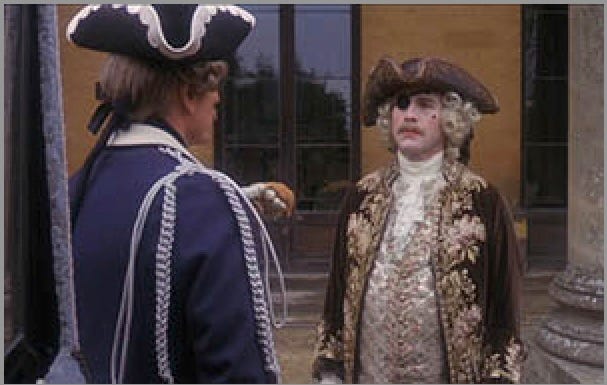
Summary of Rational Choices and Interactions
Each character’s decisions are deeply interdependent, driven by their own motives, perceptions of others’ goals, and calculations of the likely outcomes:
1. The Prince:
Refuses to pay but avoids direct accusations, betting on the Chevalier’s unwillingness to risk escalation.
2. The Chevalier:
Orchestrates a situation where the Ministry intervenes, ensuring payment and safe departure.
3. The Ministry:
Resolves the issue discreetly by expelling the Chevalier and paying him to go quietly, avoiding political fallout.
4. Barry and the Chevalier:
Exploit the Ministry’s priorities to achieve their goals without direct conflict.
Broader Implications
This scene exemplifies how complex social and political dynamics intertwine, with each character’s actions reflecting a nuanced understanding of power, honor, and self-preservation. The Chevalier’s manipulation of institutional priorities highlights his cunning, while the Prince’s reticence underscores the importance of perceived honor in aristocratic circles. The Ministry’s intervention reveals the lengths to which institutions will go to maintain order and avoid scandal.
Here's the point: If these characters were not able to consider things from the perspective of the others, and plan their strategies accordingly, then would we call them intelligent?

